#people have been saying bi jolie rights for ages so it's like. ok. what female character was she canonically close with
Text
the ultimate off-page kotlc love triangle was between brant and jolie and vertina. discuss.
#i'll start off first#brant and vertina did not have feelings for each other. idk if they tolerated each other or hated each other from the start#but they definitely hated each other at the end#people have been saying bi jolie rights for ages so it's like. ok. what female character was she canonically close with#and that goes to vertina the spectral mirror. which is. interesting. since vertina is only coded. not actually sentient#so it's either: jolie fell for someone that doesn't have romantic attraction coded into them (same here vertina)#or: elvin tech is so advanced that she can develop romantic attraction and that's an extra layer as to why she was so upset about jolie's#passing#OR: they both fell for each other but either wouldn't admit it or couldn't make it work#and brant x jolie is obvious. we don't need to explain there#listen ik jolie x vertina#has crackship vibes but there's POTENTIAL. think about how much we hear that jolie and vertina were close. think about how sophie needs#a bicon to look up to. someone to look at for reference as to where to put her footsteps because we all know sophie foster is bi as fuck#WE HAD THE BEE MOVIE WE CAN HAVE THIS#LET ME HAVE MY ELF X TECHY MIRROR SHIP. I WILL EVENTUALLY WRITE A FIC IF I HAVE TO. IT'S BEEN ON MY MIND FOR WAY TOO LONG OK#kotlc#keeper of the lost cities#jolie ruewen#kotlc brant#kotlc vertina#IT'S ABOUT THE CHILDHOOD FRIENDS TO LOVERS AND THE ANGST OK
143 notes
·
View notes
Text
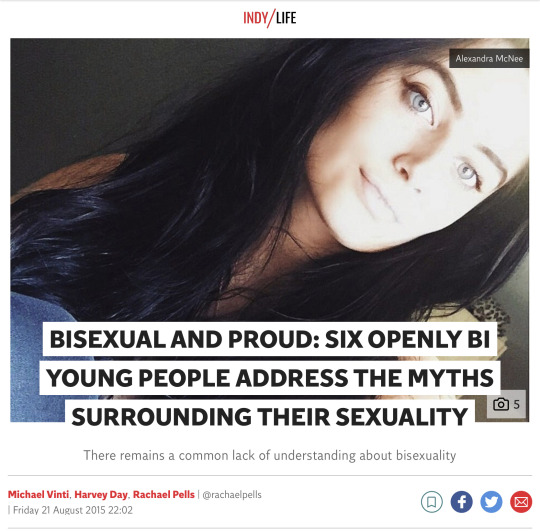
Half of Britain’s young people do not think of themselves as ‘100 per cent heterosexual’, a YouGov survey revealed this week.
Yet there remains a common lack of understanding about bisexual people, with some Britons still unfairly viewing them as the ‘black sheep’ of the LGBT community.
One factor may be the wide and confusing variety of different terms people now adopt – including ‘pansexual’, ‘fluid’ and ‘homosexible’.
But for many young people, sexuality no longer needs to fit into one of two or three definitions. Speaking to The Independent, six openly bisexual young people discuss their sexuality – and address the myths surrounding it.
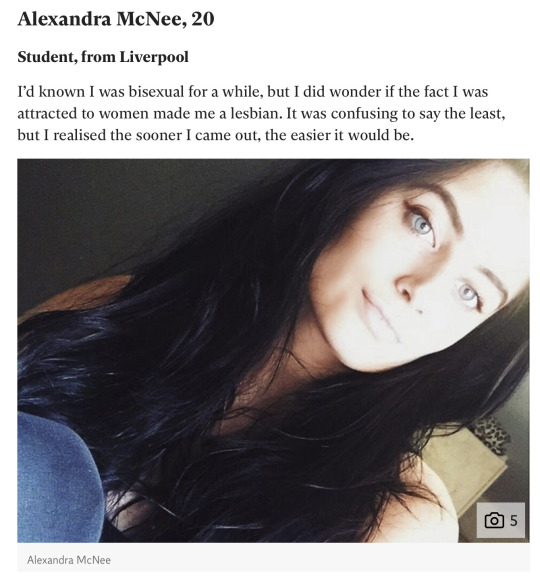
I’d say I’m actually more pansexual, which means I can be attracted to all genders – if I like someone, it doesn’t matter if they’re trans, male-female, fluid or anything else. It just means I don’t judge anyone by their sexuality or gender, but I think that’s even harder for people to understand.
I was confident my close circle of friends would be supportive when I came out, but I wasn’t sure about my parents. I thought they’d just think I was confused, so it took me a while to admit it to them – and when I did, they thought I was joking.
Some people still can’t believe that I have a girlfriend, and they assume that I am a lesbian. Others say, “Oh, you’re just a bit greedy” when I try and explain it to them, but I’m not at all, I’m just open-minded. I do still wonder to myself about my sexuality and whether or not I’ve ‘gone off’ boys but I am just as much in love with Brad Pitt as I am with Angelina Jolie.
My sexuality doesn’t define me but it is certainly a part of who I am and I strongly think it should be talked about more in schools. There are people much younger than me trying to figure out what they are and what they want and it needs to be said aloud that all variations of sexuality are OK.
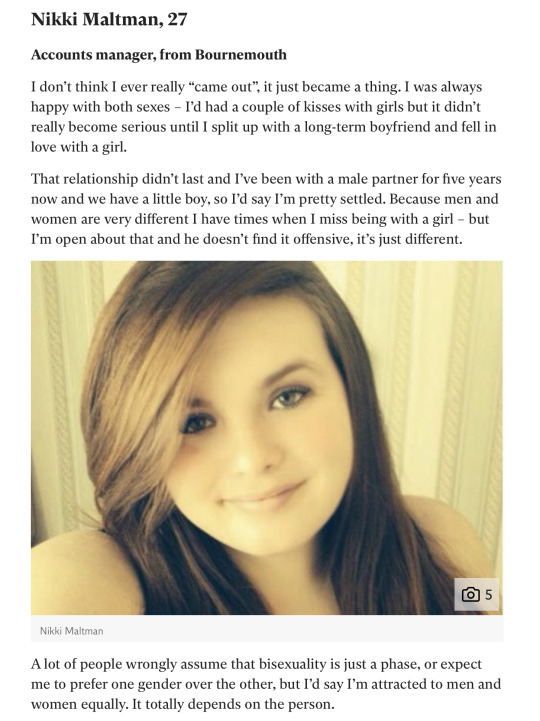
I did receive a bit of hostility when I split up with my ex-girlfriend. Some of the people who had been friendly with us and accepted me being with a woman couldn’t understand it when I started going out with a man. All of a sudden they were quite cold and it was almost like I wasn’t in the club anymore because I wasn’t lesbian or gay.
Sexuality is a broad spectrum. I don’t think it’s as simple as gay, straight, bisexual, pansexual – we’re complicated.
I know people struggle and get prejudice but I’d tell young people coming out as bi just to smile and let it go. They’ll hear the “it’s just a phase” thing but I’d just say: “You know what, maybe it is, but I’ll figure it out”. Life’s too short and love is just love, it doesn’t matter what that means.
Simone Webb, 22
Recent graduate, from Loughton, Essex
I realised I was bisexual at around 14 or 15. I was ‘out’ online a little bit before that, but it was a gradual thing rather than a lightning flash. I was worried about coming out because it felt awkward to bring up out of the blue. It didn’t feel like a big deal so raising it almost felt like making an issue out of it, but everyone was really accepting.
When I came out to my friends there was no one who was actively bi-phobic, but some people asked how I could know if I hadn’t had sexual experiences with both men and women. They’d say stuff quite loudly across the room and I found out people had been talking about it behind my back, but I had a relatively easy time compared to a lot of LGBT people.
I can’t remember the last time I saw a character on TV that was bisexual; you get characters that reject labels but very few who have the label of bisexual. There are very high-profile people who have come out as bisexual but bi-women especially get overlooked. Anna Faris is an actress who is openly bisexual but it isn’t really talked about, Angelina Jolie as well. These are high-profile people but if bi-women are married to or in a relationship with a man their bisexuality is erased.
I don’t think my bisexuality has affected my relationship hugely. I’m surprised the number of young people who identify as not 100% heterosexual is so high but I’m not surprised that more people are moving away from the idea of being attracted solely to one gender.
Liam [surname witheld]
Student in Canterbury, Kent
About two years ago I came out as bisexual; I’d just moved to university and being in a different environment I felt I could branch out and find out a bit more about myself.
I still haven’t come out to my family, but my friends have been overwhelmingly supportive.
I’ve had people say that I’m straight and looking for attention – it’s mostly gay people who say that – and that I’m gay and scared of coming out, which is mostly from straight people in my experience. It makes it hard to feel I belong anywhere.
People also tell me I’m greedy – that’s probably the most common one. I think it’s a problem with society as a whole in that when people deviate away from the “norm” it’s seen as weird. People just assume things because they don’t understand. I generally think people are becoming more open-minded towards sexuality though. I’ve got friends who I know for a fact if I’d spoken to them five or six years ago they’d have thought I was lying but now they accept that bisexuality exists.
If you spend 20 years as a straight person and everyone around you knows you as that, it’s hard to change that perception. I know that it would have been more difficult for me if I’d stayed in my home town and hadn’t had that chance to start somewhere afresh.
I haven’t had a boyfriend but I’ve had plenty of girlfriends and sexual encounters with both sexes. The only real relationships I’ve had have been with other bisexuals, which I count as quite lucky. Some prospective partners have been against the idea of bisexuality just because they see it as greediness. They worry that I’ll cheat because I’ve got a larger pool of resources, as it were. It’s not the case though. It’s prejudice and comes from an irrational place.
Women in particular get a bit of judgement in the gay community – it’s more often seen as just a phase. I’m quite lucky I haven’t had too many negative comments, but then I’ve surrounded myself with the right people.
It makes sense that the vast majority of people would not say that they are hetero-normative because I think people are now more able to label themselves how they please. It’s not as simple as “gay” and “straight”; there’s pansexual or a-sexual, and so many other ways to describe yourself. The internet makes it easier for people to learn about it and understand their sexuality better at a younger age.
Georgie Robbins, 25
Music journalist, from Somerset
I know I’ve been exceptionally lucky in the experience of my bisexuality – I haven’t faced any real prejudice at all. My parents were amazingly accepting and told me the only thing that mattered to them was that I was happy.
The only resistance I’ve ever had is convincing others that just because I may happen to be with a girl at one time, that’s not to say I only like girls. I get the impression that some people feel that bisexual relationships are somehow less serious than heterosexual ones because the gender of the person I’m in a relationship with might change.
I have wanted to explore my sexuality more but sometimes I feel like others don’t accept a fluid sexuality. People assume things and put me in a box.
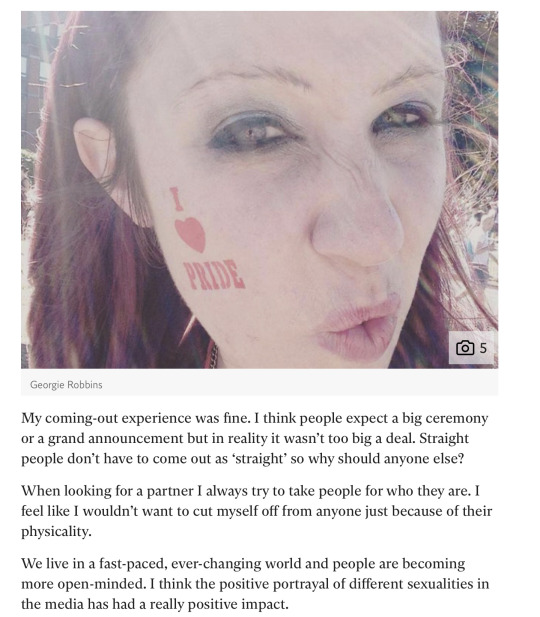
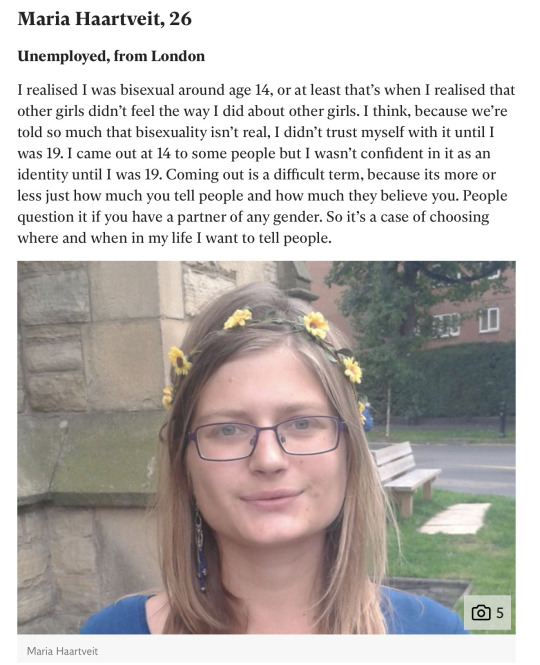
I’m not surprised about the number of young people who identify as not 100 per cent straight. I think it stems from people coming to terms with ideas around mono-sexuality. Everyone is assumed mono-sexual based on how they act but sexuality isn’t like that.
I think attitudes are changing because people are talking about it more freely. What interests me is that not a lot of people use “bisexuality” as a term, they use labels like “fluid” or “queer”.
I think bisexuality as a label carries a lot of distrust because of stereotypes that come with it; there is this idea of it not being real. I think people are saying they don’t want a label because they may not feel ‘bi-sexual enough’ and because of the negative stereotypes.
#bisexuality#bi tumblr#bisexuality is valid#bi pride#lgbtq community#bi#lgbtq#support bisexuality#lgbtq pride#pride#the struggle is real#bisexual stereotypes#bisexual struggle#bisexual education#bisexual nation#bisexual rights#bi youth#bisexual youth#bi+#support bisexual people#respect bisexual people#bisexual community#bisexual myths#bisexual injustice#bisexual#bisexual positivity#bi positivity
19 notes
·
View notes